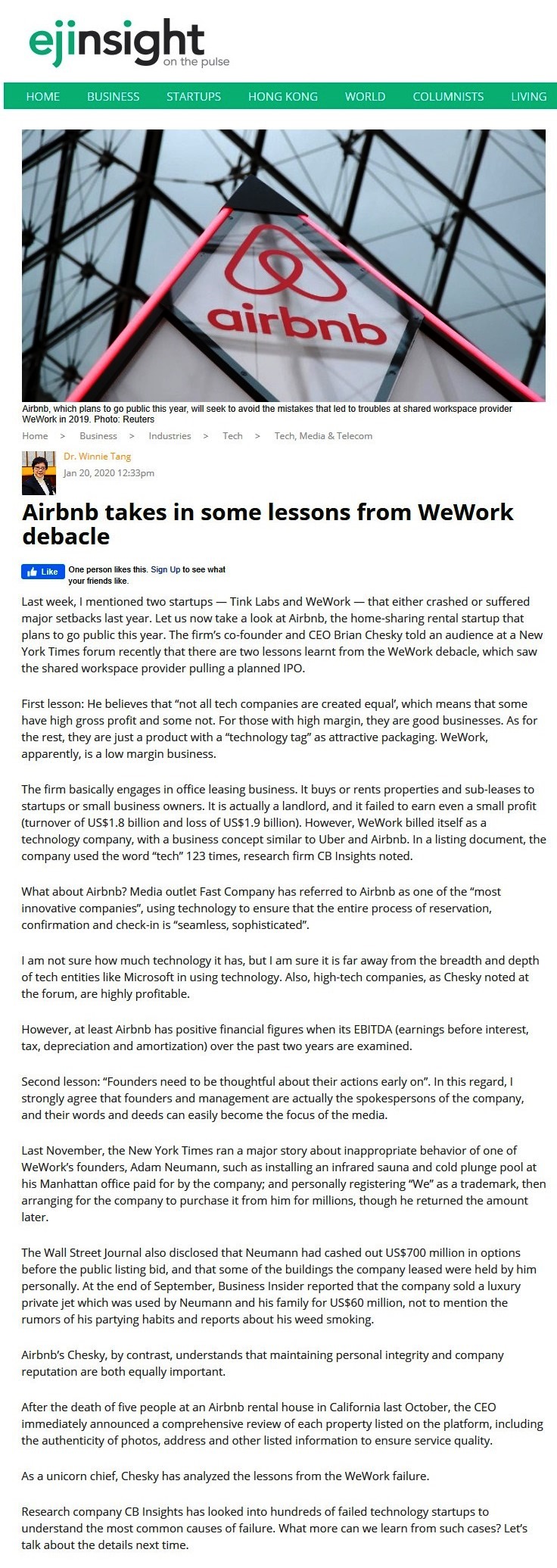網上版請按此

Airbnb takes in some lessons from WeWork debacle
Last week, I mentioned two startups — Tink Labs and WeWork — that either crashed or suffered major setbacks last year. Let us now take a look at Airbnb, the home-sharing rental startup that plans to go public this year. The firm's co-founder and CEO Brian Chesky told an audience at a New York Times forum recently that there are two lessons learnt from the WeWork debacle, which saw the shared workspace provider pulling a planned IPO.
First lesson: He believes that "not all tech companies are created equal", which means that some have high gross profit and some not. For those with high margin, they are good businesses. As for the rest, they are just a product with a "technology tag" as attractive packaging. WeWork, apparently, is a low margin business.
The firm basically engages in office leasing business. It buys or rents properties and sub-leases to startups or small business owners. It is actually a landlord, and it failed to earn even a small profit (turnover of US$1.8 billion and loss of US$1.9 billion). However, WeWork billed itself as a technology company, with a business concept similar to Uber and Airbnb. In a listing document, the company used the word "tech" 123 times, research firm CB Insights noted.
What about Airbnb? Media outlet Fast Company has referred to Airbnb as one of the "most innovative companies", using technology to ensure that the entire process of reservation, confirmation and check-in is "seamless, sophisticated".
I am not sure how much technology it has, but I am sure it is far away from the breadth and depth of tech entities like Microsoft in using technology. Also, high-tech companies, as Chesky noted at the forum, are highly profitable.
However, at least Airbnb has positive financial figures when its EBITDA (earnings before interest, tax, depreciation and amortization) over the past two years are examined.
Second lesson: "Founders need to be thoughtful about their actions early on". In this regard, I strongly agree that founders and management are actually the spokespersons of the company, and their words and deeds can easily become the focus of the media.
Last November, the New York Times ran a major story about inappropriate behavior of one of WeWork's founders, Adam Neumann, such as installing an infrared sauna and cold plunge pool at his Manhattan office paid for by the company; and personally registering "We" as a trademark, then arranging for the company to purchase it from him for millions, though he returned the amount later.
The Wall Street Journal also disclosed that Neumann had cashed out US$700 million in options before the public listing bid, and that some of the buildings the company leased were held by him personally. At the end of September, Business Insider reported that the company sold a luxury private jet which was used by Neumann and his family for US$60 million, not to mention the rumors of his partying habits and reports about his weed smoking.
Airbnb's Chesky, by contrast, understands that maintaining personal integrity and company reputation are both equally important.
After the death of five people at an Airbnb rental house in California last October, the CEO immediately announced a comprehensive review of each property listed on the platform, including the authenticity of photos, address and other listed information to ensure service quality.
As a unicorn chief, Chesky has analyzed the lessons from the WeWork failure.
Research company CB Insights has looked into hundreds of failed technology startups to understand the most common causes of failure. What more can we learn from such cases? Let's talk about the details next time.
Dr. Winnie Tang
Adjunct Professor, Department of Computer Science, Faculty of Engineering and Faculty of Architecture, The University of Hong Kong